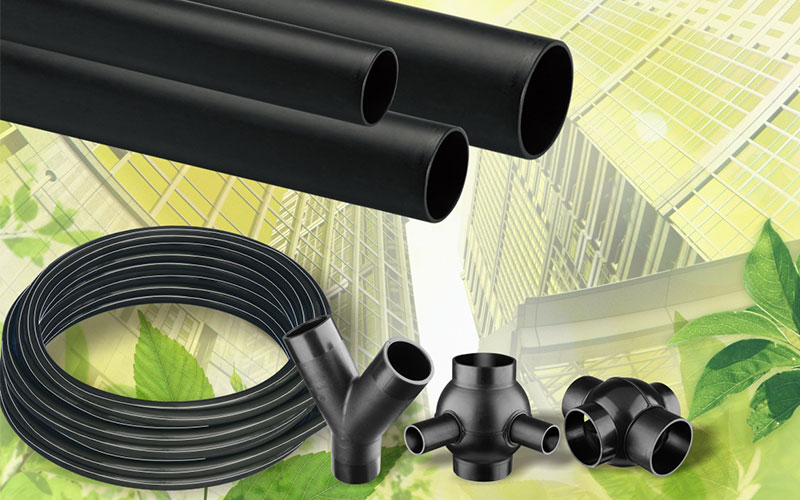Comprehending the Key Conveniences of HDPE Pipe for Water and Wastewater Administration
Using HDPE pipe in water and wastewater administration offers countless advantages that warrant consideration. Its exceptional durability and long life-span make it a favored option for numerous jobs. In addition, the material's resistance to corrosion and chemical damage enhances its dependability in numerous settings. The advantages expand past just durability and resistance. Texas hdpe pipe manufacturer. Exploring its cost-effectiveness and environmental effect reveals a lot more compelling reasons for its widespread adoption in modern-day framework
Exceptional Toughness and Long Life

HDPE pipeline stands out for its exceptional toughness and durability, making it a recommended choice in water administration systems. Constructed from high-density polyethylene, these pipelines can hold up against considerable stress and stress and anxiety, making sure reliable performance gradually. Their robust nature allows them to endure extreme environmental conditions, including temperature level changes and dirt activities, which can cause various other materials to stop working.
The life-span of HDPE pipelines commonly exceeds 50 years, giving a cost-efficient solution for municipalities and markets alike. In addition, the material's light-weight residential properties simplify installment, lowering labor prices and timeframes. This durability minimizes the need for frequent repair work or replacements, even more enhancing its economic appeal.
In water administration applications, the dependability of HDPE pipes means less disturbances and boosted solution continuity, making them important to sustainable facilities development. The combination of toughness and long life strengthens HDPE's duty as a keystone in effective water management solutions.

Resistance to Corrosion and Chemical Damages
While numerous products catch deterioration and chemical damage in time, HDPE pipes show amazing resistance, making them optimal for numerous water administration applications. This strength stems from the molecular structure of high-density polyethylene, which is naturally non-reactive and does not rust like metals or deteriorate from direct exposure to rough chemicals. Because of this, HDPE is very effective in environments with hostile materials, such as wastewater systems that may consist of acids, bases, and organic solvents.
Furthermore, HDPE pipes can withstand ecological elements such as dirt acidity and saline conditions, even more improving their viability for varied applications (American Plastics HDPE Pipe for Oilfield). Their capacity to preserve architectural honesty in time lowers the threat of leakages and failures, which is essential in making certain the safety and integrity of water circulation and wastewater management systems. The resistance to deterioration and chemical damage substantially contributes to the general efficiency and longevity of HDPE piping services.
Cost-Effectiveness and Economic Advantages
When taking into consideration the monetary effects of water administration systems, the cost-effectiveness of HDPE pipes ends up being evident. These pipes offer reduced installation and upkeep costs compared to standard materials like metal or concrete. Their lightweight nature simplifies transport and installment, causing lowered labor expenses. Additionally, HDPE pipes display a long lifespan, commonly exceeding half a century, which converts to fewer substitutes and long-term savings.
In addition, the resistance of HDPE to rust and chemical damage reduces the requirement for pricey fixings and substitutes. The pipelines also support efficient water flow, reducing power costs connected with pumping systems. By minimizing leaks and water loss, HDPE pipes add to substantial economic benefits for municipalities and industries alike. Generally, the first financial investment in HDPE piping can produce significant economic returns over the life expectancy of the water monitoring system, making it a sensible option for lasting official source infrastructure growth.
Ecological Sustainability and Decreased Effect

Convenience and Flexibility in Installment
Due to their distinct homes, HDPE pipes offer amazing convenience and adaptability in installation, making them ideal for a large range of applications. Their lightweight nature permits simpler handling and transportation, minimizing labor costs and installment time. HDPE pipelines can be curved and formed to fit different terrains and job requirements, which is specifically valuable in challenging atmospheres.
Furthermore, their resistance to rust and chemical damages enables for installment in diverse setups without the need for specialized protective coatings. The capability to fuse joints produces a continual, leak-free system, boosting the overall integrity and integrity of the installation. HDPE's versatility likewise suits ground motion, minimizing the danger of damages in areas susceptible to shifting dirt. Generally, these characteristics make HDPE pipelines not only flexible however also a preferred choice for water and wastewater administration systems.
Frequently Asked Questions
Just How Does HDPE Pipeline Compare to PVC in Water Monitoring Applications?
HDPE pipe offers superior adaptability, resistance to corrosion, and sturdiness compared to PVC. Its lighter weight facilitates easier installment, while its lengthy lifespan decreases substitute costs, making HDPE a favored selection in water monitoring applications.
What Is the Life Expectancy of HDPE Piping Under Common Problems?
Under regular conditions, HDPE pipes can have a lifespan ranging from 50 to 100 years. Their durability and resistance to rust add to their lasting efficiency in numerous applications, making them a reliable selection for infrastructure.
Are HDPE Pipeline Recyclable After Their Life Span?
Yes, HDPE pipelines are recyclable after their life span. custom hdpe Homepage pipe manufacturing Midland TX. They can be refined and repurposed right into brand-new items, substantially decreasing environmental impact and advertising sustainability within the industry, making them an environmentally friendly option for piping options
What Is the Installation Process for HDPE Pipeline?
The setup procedure for HDPE pipes involves website prep work, trenching, pipeline blend or mechanical signing up with, backfilling, and pressure screening. Proper techniques assure a sturdy and effective system for carrying water and wastewater properly.
Can HDPE Water Lines Be Used for Both Potable and Non-Potable Water Systems?
Yes, HDPE pipelines can be made use of for both safe and clean and non-potable water supply. Their convenience, sturdiness, and resistance to rust make them appropriate for various applications, ensuring secure and reliable transportation of water in different contexts.